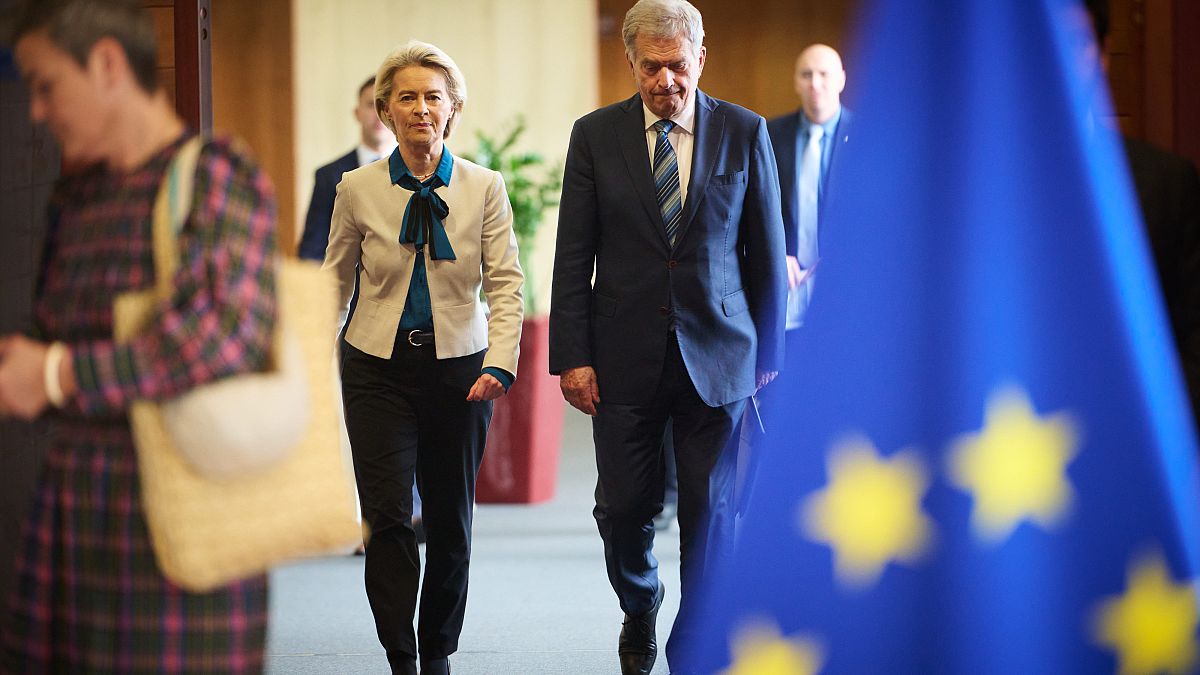EU urgently needs to act on defence, says landmark report

The EU must signal to the US that it is prepared to pay its way on miltary and civil preparedness, former Finnish President Sauli Niinistö says in a new report presented to Commission President Ursula von der Leyen on Wednesday.
The EU urgently needs to be more pro-active in its response to the increasingly complex crises facing the world, according to a report on Europe’s civilian and military preparedness published today by former Finnish President Sauli Niinistö.
Writing just a week before key US presidential elections, Niinistö said the EU needed to send a signal that it was willing to pay its way on defence, adding that the bloc should spend around 20% of its budget, currently worth around €1 trillion over seven years, on security and crisis preparedness.
“Threats don’t stop at our borders, they cascade between the interconnected sectors of our economy,” said Niinistö’, whose report was requested by European Commission President Ursula von der Leyen, adding that “if we are not doing all we can for our own security, we cannot expect others to do it for us”.
“The currently available funding from the EU budget for defence-related expenditures is below what is needed in light of the strategic context … this is an important signal to the US and other key partners,” he said.
In recent years the EU has faced several crises, including the Covid-19 pandemic, a war on our borders and the hottest year on record, but despite collective efforts, member states are not yet fully prepared for the most serious multi-dimensional crisis scenarios, the 165-page long report said.
Pan-European spy agency in prospect?
The report also includes plans for greater intelligence cooperation – a controversial topic given national spy agencies’ tight grip on security issues.
Niinistö calls to “strengthen EU intelligence structures step-by-step towards a fully-fledged EU service for intelligence cooperation”, citing the power “to coordinate specific counter-espionage tasks.”
That echoes a previous 2022 commitment from the EU’s external action service, which pledged stronger capacity in intelligence analysis, building on national security services – a move von der Leyen said was in the interests of EU countries given common cross-border threats.
“We should build on improving the flow of information gathering and intelligence,” she said in a Wednesday press conference, adding: “it’s in the interest of all of us” to respond to cross-border threats.
The report comes as the US prepares to go to the polls on 5 November. The idea that Republican candidate Donald Trump might cut aid to war-torn Ukraine, or even abandon his mutual defence commitment to NATO members, has sent panic across Europe.
A €1.5 billion European Defence Industrial Programme proposed by the Commission in March has been criticised for its insufficent resources – and there are hopes of a refocus when the bloc proposes a rejig of its seven-year budget, due next year.
Niinistö warned of two main gaps in the EU’s preparedness strategy: the lack of a clear plan in the event of armed aggression against a member state, and the absence of a fully operational EU capacity to coordinate and act together across institutional and operational silos.
“The territorial integrity and political independence of every Member State are inextricably linked. If the security of one Member State is breached or its sovereignty violated, this directly concerns the other 26 and the Union as a whole,” the report reads.
The war in Ukraine has also highlighted the significant gaps in Europe’s military and defence capabilities – which the Commission estimates will need some €50 billion injected over the next decade to remain competitive with global players such as the US and China.
“Member States should strengthen their cooperation on European defence, jointly investing more to close long-standing gaps in our military and defence industrial readiness,” he added, while stressing the importance of supporting Ukrainian industry in the long term.
Despite an increase in member states’ defence budgets last year, fewer than one in five investments in defence programmes are made jointly, and 82% of defence funding and procurement is allocated nationally.
The report aims to serve as a wake-up call to member states, with the former Finnish president recommending that they work more closely together, faster and with citizens at the heart of the crisis preparedness strategy – but it also touts enhanced cooperation between groups of willing member states where necessary.
“Many of the proposals made in this report will no doubt be difficult to reach consensus on among Member States, … We should also be open to launch new initiatives enhancing preparedness, where needed only among willing Member States, to enable faster action,” it suggests.
UPDATE (30 October, 14:30 CET):adds comments regarding intelligence cooperation.
Related
A New Book Argues That What Happens in Europe Doesn’t…
Remaking the World: European Distinctiveness and the Transformation of Politics, Culture, and the Economy by Jerrold Seigel “No issue in world
Poland plans military training for every adult male amid growing…
Poland’s prime minister, Donald Tusk, has said his government is working on a plan to prepare large-scale military training for every adult male in response t
2025 European Athletics Indoor Championships: Ditaji Kambundji secures women’s 60m…
Switzerland’s Ditaji Kambundji walked away from the 2025 European Athletics Indoor Championships in Apeldoorn on 7 March with much more than her first Europea
Takeaways from the EU’s landmark security summit after Trump said…
BRUSSELS (AP) — European Union leaders are trumpeting their endorsement of a plan to free up hundreds of billions of








